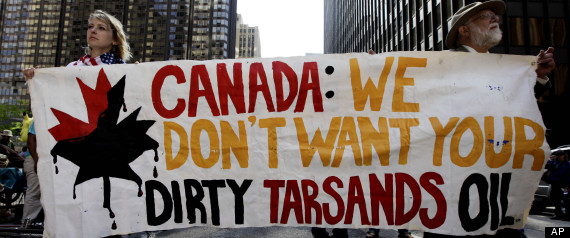Prime Minister Stephen Harper warned that Canada would not take no for an answer from the United States on the Keystone XL pipeline and declared that political calculations were the only obstacle blocking the project.
In pointed remarks to an audience in New York, Mr. Harper asserted that the arguments in favour of the proposed pipeline were “overwhelming” and vowed to continue his campaign to win approval for the project until it succeeds.
“My view is that you don’t take no for an answer,” Mr. Harper said. “We haven’t had that [from the U.S.], but if we were to get that, that won’t be final. This won’t be final until it’s approved and we will keep pushing forward.”
Mr. Harper didn’t spell out what Canada would do if Keystone were rebuffed, but did point to demand for Canadian energy around the world and to proposals for eastern and western pipelines. “If I were an American the last thing I would want to see is Canada selling its oil anywhere else.”
Despite Mr. Harper’s talk of persevering on Keystone, Canada appears to have no formal options for reviving the project if Barack Obama rejects it. Ottawa could attempt to persuade the U.S. President to change his mind, although such an effort is highly unlikely to succeed.
The Keystone pipeline has emerged as one of the most contentious issues in U.S. politics, attracting fervent supporters and equally passionate opponents. Its defenders say it will create much-needed jobs while adversaries contend it will accelerate climate change.
Mr. Harper dived into the centre of the debate in his comments Thursday to a group of about 150 business people at a hotel in midtown Manhattan.
The project “is so clearly in everybody’s interest,” he said. The long delay in getting it approved is “just politics,” he added. “Over time, bad politics make bad policy and I believe that in strong, advanced countries and economies like ours bad policies ultimately get reversed.”
Mr. Obama, he continued, “has always assured me that he’ll make a decision that’s in what he believes is the best interest of the United States based on the facts.”
Mr. Harper’s remarks came amid an atmosphere of uncertainty surrounding the pipeline. A final decision from Mr. Obama was expected this summer after a review of the project by the State Department, which said it would not have a substantial impact on the rate of development of the oil sands. In June, Mr. Obama said he would approve the project only if it does not “significantly exacerbate” the problem of greenhouse-gas emissions.
Representatives of the energy industry welcomed the Prime Minister’s involvement. “Keystone XL has become a very emotional and political issue, so having the support of our political leaders in sharing the facts … is invaluable,” said TransCanada Corp. spokesman Grady Semmens in an e-mail.
Mr. Harper’s declaration that he will not take no for an answer is a reflection of Keystone’s importance as a cross-border issue, said Greg Stringham, vice-president for oil sands and markets at the Canadian Association of Petroleum Producers. “We’ve had a very strong history of really good relationships in energy, back and forth. So I think the Prime Minister is just emphasizing that,” he said.
Critics disagreed. Rachel Wolf, a spokesperson for All Risk, No Reward, a coalition of anti-Keystone groups, said that Mr. Harper’s comments seemed “pretty disrespectful of President Obama and the process the U.S. has in place to make this decision.”
The Prime Minister spoke at a question-and-answer session hosted by the Canadian American Business Council and moderated by Maria Bartiromo, an anchor for the financial news channel CNBC.
He lauded Canada as an investment destination and touted his government’s success in pursuing free-trade agreements. He noted that Ottawa is in the final stages of negotiating a free trade deal with the European Union and “making progress.” If that accord materializes, he said, Canada would be the “only advanced economy with free trade access to both the United States and the European Union.”
In response to a question from the audience, he also underlined the need for more women at the top levels of the corporate world. In the federal government, he noted, half of senior positions are held by women. “I don’t purport to know all the reasons for the barrier” to such progress in business, he said, but “you’re running out of excuses.”
After the event, Mr. Harper held a roundtable with a heavyweight lineup of chief executives, including the leaders of IBM, Cargill and Chevron. Earlier in the day he held a private breakfast with investors and business executives, then met with Malala Yousafzai, a Pakistani teenager who was shot in the head after defying militants by going to school.
With reports from Kelly Cryderman in Calgary and Paul Koring in Washington
Harper ‘won’t take no for an answer’ from U.S. on Keystone XL























Laissez un commentaire Votre adresse courriel ne sera pas publiée.
Veuillez vous connecter afin de laisser un commentaire.
Aucun commentaire trouvé